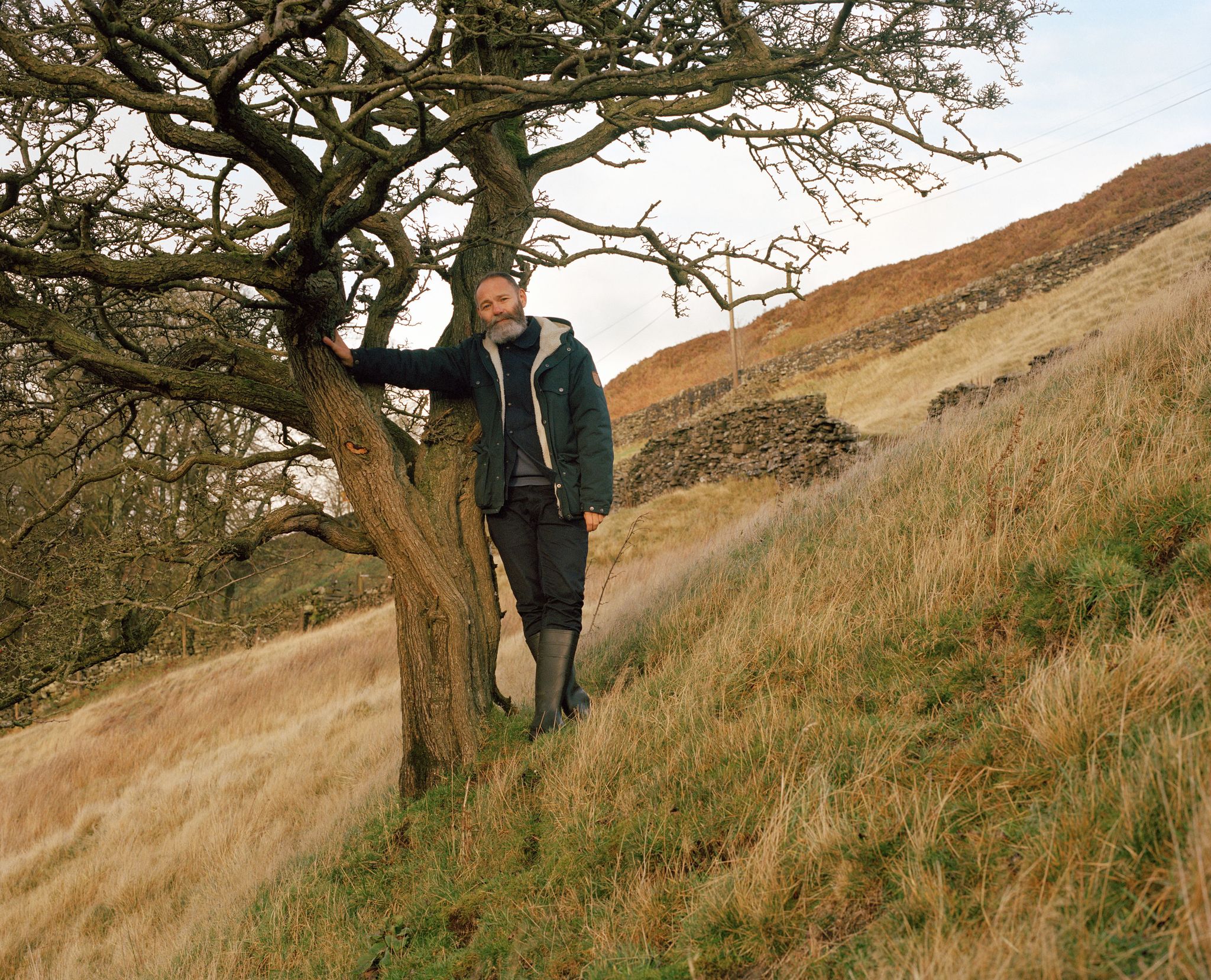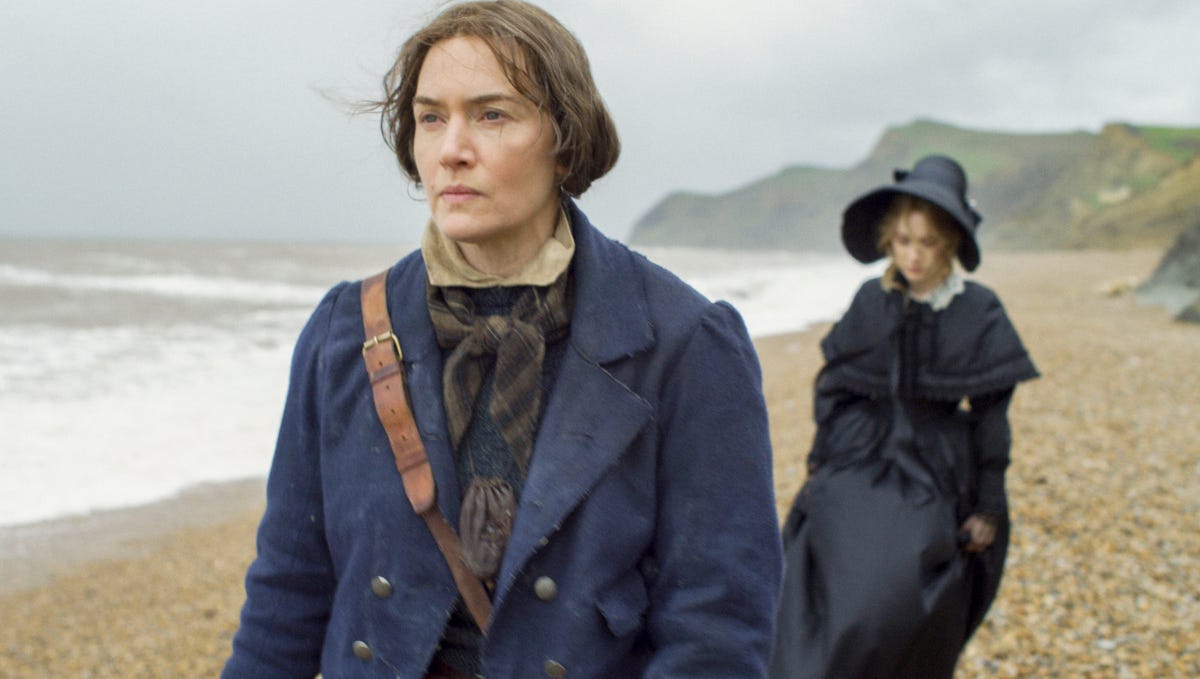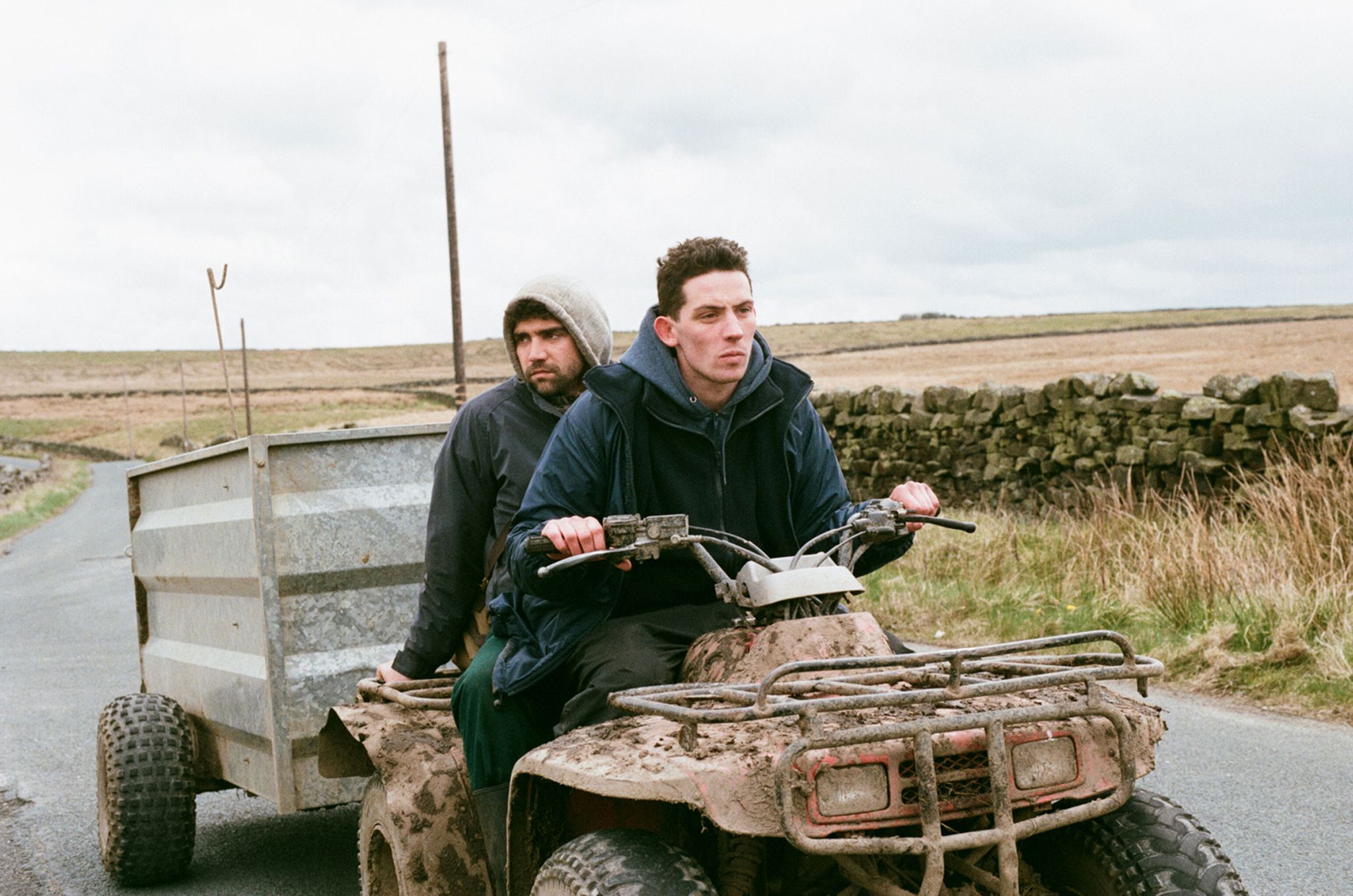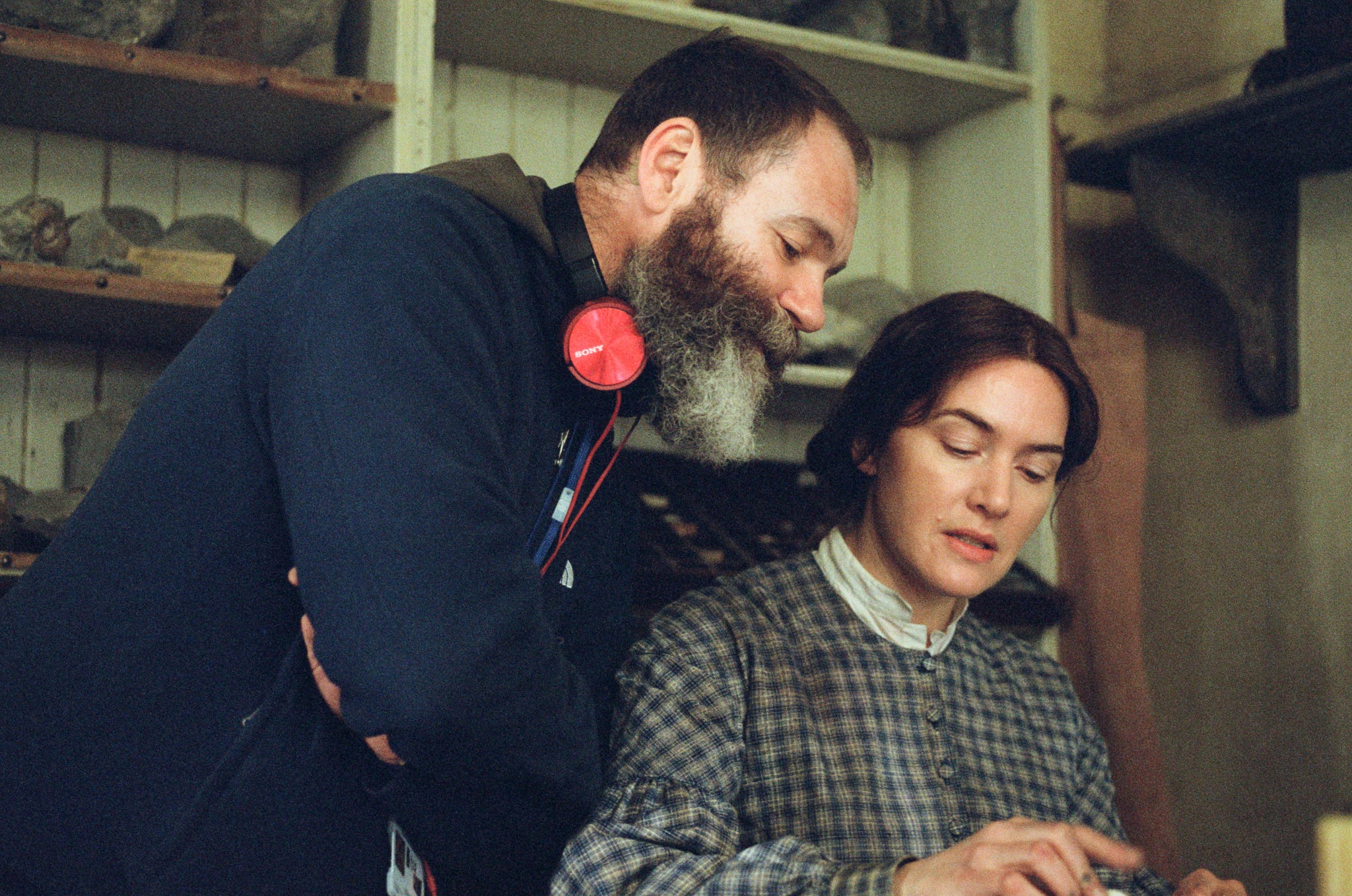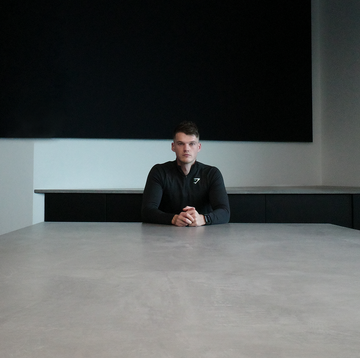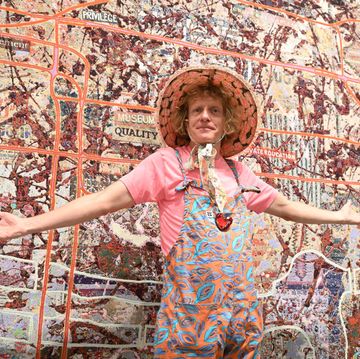The film-maker Francis Lee lives alone in a wooden hut on the side of a steep hill, in the windswept Yorkshire countryside. From the table he works at he can look out of a window onto a valley, and hills beyond: dark, ancient, forbidding. For an incurable romantic his gaze, like that of his camera, is startlingly unsentimental. He has no illusions about this place. It is beautiful but lonely. The solitude wears Lee down but it feeds him, too: it allows him access to the thoughts and feelings of the imaginary people he writes about. These are not happy-go-lucky characters, but rather taciturn outsiders, walled off from the world by their unhappiness.
At 50 years old, Lee, who didn’t make his first feature until 2017, has lately become a significant figure in independent film. He is the writer-director of two coruscating English romances, ardent but austere, in which marginalised, working-class characters, living in isolated rural communities, have their armour pierced by beautiful newcomers from other worlds. These are God’s Own Country, in which an angry, alienated Yorkshire farmer, played by Josh O’Connor, falls in love with a Romanian migrant; and Lee’s new film, Ammonite, in which a poor, heartbroken fossil hunter in 1840s Dorset, played by Kate Winslet, embarks on an affair with a visitor from well-heeled London.
“I think Francis is aware,” Winslet tells me, “that to hang on to his quite singular way of seeing things, and writing about them, it helps him to be a bit separate, immersed in his own space.”
“He embraces it,” says O’Connor, until lockdown a regular visitor to the hut, of the loneliness Lee feels there. “He is melancholic. It’s something he can tap into. It’s all part of the richness of his work.”
Lee accepts all this. Living where he does, he says, allows him “to write the things that I write. And when I write I do consciously shut myself off.” It’s his gift and his curse.
Just four years ago, when he released God’s Own Country, Lee was a failed actor, with close to two decades behind him of minor parts in mediocre TV dramas and crummy commercials. He was working at what he describes as a scrapyard in south London, having spent much of his twenties and part of his thirties in semi-poverty, sleeping on friends’ sofas, sometimes so short of funds he couldn’t make bus fare. “I remember you could get 10 apples for a pound at Brixton Market,” he says, “and I would live off those.”
Beginning when he was 40, Lee made three short films, all set in Yorkshire, where he was born and raised, in a rented cottage on the side of another windswept hill. He all but howls with shame when I mention The Farmer’s Wife (2012), which follows Geraldine James’s widow through her last day on her smallholding, the actress’s fiercely handsome face set stoically against the unfeeling landscape and the glowering skies.
“If you had a list of all the things not to do in a short film, they would all be in that,” he says. “I think there’s even a dripping tap.”
Bradford Halifax London (2013) fixes a camera on a bickering Yorkshire family trapped together on a train. The Last Smallholder (2014) is a documentary about Lee’s father, Carson Lee, portraying a life of fulfilment achieved through hard work. Today, Carson lives just down the road with Lee’s stepmother and, at 80, still chops wood for a living.
Lee’s short films, when seen at all, were not regarded as the works of a man likely to set the world of independent cinema ablaze. They weren’t shortlisted for prizes or selected for major festivals. “I wasn’t on anybody’s radar,” Lee says, “let’s put it that way.”
Nor did his script for God’s Own Country meet with panting enthusiasm: “People were like, ‘There’s too much description and nobody talks’.” His agent sent the script and his shorts to the British Film Institute, hoping to attract Lottery funding. “We got a note back from the head of the Film Fund saying, ‘This is a terrible script, and it’s really small, and no one will ever see it, and Francis Lee’s short films aren’t very good, and we don’t think he’s a very good director.’” (He’s paraphrasing. I think.)
A year later, he suggests for political reasons, the BFI decided it would, after all, fund God’s Own Country. “But nobody really cared,” he says. “There was no one famous in it. I’d never made a film. We were on a hill up here and no one bothered us. The odd farmer would walk past and think we were silly buggers. But apart from that, it was very quiet and private.”
He sounds like he misses the freedom he had, then. And I suspect he does. The feelings of being under-the-radar, overlooked and ignored, these fuel his fire just as much as the solitude. When I suggest that people now very much care about his work, hence my driving to Yorkshire during a pandemic to talk about it, he emits an incredulous shriek: “Do they?”
Lee’s protestations of embarrassment end when we come to talk about God’s Own Country, which premiered at the Sundance Film Festival, in January 2017, to rapturous applause. It is a strikingly assured debut, clear-eyed and tough minded, muscular yet tender. Its maker appeared to emerge fully formed, with his own distinctive style, bracingly naturalistic, viscerally sensual. Wherever you are when you watch God’s Own Country, you can feel the slap of the wind and the sting of the rain, you can smell the muck and taste the cheap beer Josh O’Connor’s embittered binge-drinker pours down his throat.
O’Connor is famous now, as Prince Charles from The Crown, among other things. In 2017, he was largely unknown, and his performance as Johnny Saxby, the scowling farmer, was a revelation. It was also unhealthily committed. O’Connor lost so much weight he ended up
in hospital on a drip, but such is the devotion Lee inspires in his actors. O’Connor and Alec Secăreanu, who played Gheorghe, spent many weeks before and even during filming working on a real farm, birthing lambs and building walls and generally getting their hands filthy.
“Francis knows exactly what he wants, and there’s a directness and a precision to him that I immediately fell in love with,” says O’Connor. “He loves pushing me and I like to push myself and to throw myself into the character completely. He loves that. And there’s no embarrassment. He creates an environment where I can be fully immersed. That’s a rare thing.”
God’s Own Country changed Lee’s life, for better and worse. It took three years to make, from start to finish. He made very little money from it. And it contributed in large part to the end of a significant relationship.
“It always sounds so stupid when film-makers or artists talk about what they go through to make their work,” Lee says. “But for me, personally, to make God’s Own Country, and Ammonite, the personal sacrifices have been above and beyond.
“Personal relationships suffer massively,” he says, “because your time is constantly spent [working on the film]. And people don’t understand that. Nobody understands that. I’m lucky I didn’t lose friendships but I did lose my relationship and [his preoccupation with God’s Own Country] was part of the problem. And the success was part of the problem, too.”
Not that any of this stopped him making Ammonite, an even more personal film, just as gruelling an endeavour, and with a much more fraught journey from page to screen.
I drove from my home in London to see Lee on a day in December on which the sun never seemed to rise. So overcast was it that the moving map on my phone only once sensed that it was not actually the middle of the night and switched to daytime mode. That lasted about 15 minutes, just south of Sheffield. England was between lockdowns — like stars, Lee’s tier and mine had briefly aligned — and all the way up the M1, while the unceasing mizzle kept my wipers twitching, I listened to the sickening news: Covid cases rising; new restrictions on the way; lorries stacking up on the south coast awaiting the Brexit deal or no-deal; the poisonous rhetoric from America and elsewhere. And still the rain came.
Pathetic fallacy, this is called, when the external elements seem to mirror one’s inner feelings, or even the mood of a nation: miserable, bedraggled England, at the fag end of a plague year. Only once did I switch to music radio, to relieve the psychic load. “Last Christmas…” sang dear old, dead old George, and it really felt it might be. I put the news back on.
After the deep-pile grime of Bradford, the countryside opened up. I drove along snaking lanes, across black hills, past desolate fields, through old stone villages, slowing down for hardy walkers in anoraks. Lee’s place is not on any maps so, as instructed, I followed the satnav to a pub outside the village of Haworth — famous as home to the Brontës (experts in pathetic fallacy) — and kept going until I saw an opening in the dry stone wall. Then through an open gate and down a plunging track to the hut. The front door opens straight onto Lee’s kitchen-cum-office, where he was making coffee.
It was midday when I showed up. Lee offered the contents of his cupboard, which was three crumpets. He toasted them for me. I sat at the kitchen table, spread the butter and Marmite and chomped away while he talked. Also on the table was Lee’s laptop and a copy of the novel he has almost finished adapting for his third film, about which I am sworn to secrecy. (It’s a horror movie with strong elements of “class and queerness”, about a sad young man alone in an epic wilderness; Josh O’Connor will star.)
On another table, a bowl of lemons and a bowl filled with feathers. (As a boy, Lee showed Bantam hens in competition.) Stuck to the fridge, a postcard-sized photo of Wonder Woman and another of Kate Bush — a Brontë fan, as we know — plus a comic pencil sketch of a man in a potentially compromising position. In a spidery hand beneath him, the word “Francis”.
Lee, who is slender and compact, was wearing a navy crew-neck jumper, dark trousers and woolly socks, no shoes. Anyone seeking to describe him must first approach the beard. Josh O’Connor, asked for his first impression of meeting the man he now describes as his best friend, doesn’t prevaricate: “My first thought was, ‘What an extraordinary beard!’ Like, ‘Wow! That’s impressive.’”
Behind the hairy magnificence, Lee has kind eyes and a warm, gentle manner that might belie the steeliness that sustains him.
“You see where I live,” he said. “You can’t just walk to a shop. You can’t access anything easily. Everything’s an effort. Everything requires thought.”
As a small child, this presented no problem. “I spent all my time on the moors or down the woods or with the animals, the pigs, the cows, hens. But then it became very limiting and lonely.” When he was a teenager, “I always fantasised about a life away from this: where I would be living, what I would be doing. But even when I was living in London, I couldn’t get any of it out of my bones. It was very specifically these hills and this landscape and this light.”
From The Farmer’s Wife to Ammonite, strained relationships between parents — often frail, elderly parents — and adult children are central. His relationship with his own parents he describes as “respectful”. They split when he was 11 and both remarried, his mother eventually moving south to Northampton.
“I love them,” he says. “And I have no doubt that they love me. But it was no accident that I left home at 16 and forged my own path. And so, although I would say I’m very close to my family [he has an older sister and two younger siblings] there’s always been a bit of a distance. I felt I had to go and find my life and my self.” He didn’t come out to his parents as gay until well into adulthood. “It was something to do with the fact that I felt pretty separate from them.”
Adolescence was difficult. His secondary school was located in “a rough area. And the kids were rough. And I was a sensitive soul. I was bullied pretty horribly. And I found it very traumatising.” His natural openness and emotional honesty, he feels, were frowned upon and discouraged. He went into his shell: “It’s why I still find interpersonal relationships so difficult and painful.”
At 16, he left home to move to Wakefield, to study for his A-levels. He laughs now at the innocence of it, but at the time it felt like arriving in a major metropolis. This was the Eighties. The council paid the rent on a modest house that he shared with a friend. Was he happy in Wakefield? “Happier.”
He was already a film enthusiast, a devotee of classic Hollywood — Westerns, melodramas, all first encountered on afternoon TV — but it was a cheap automatic stills camera, acquired when he was 16, that first sparked an interest in looking at the world through a lens. The appeal, he thinks, was that “it allowed me to have some perspective and also not to participate”.
He thinks that the decision to be an actor came from a similar impulse: “Anything that gave me some distance or allowed me to be someone else, I grabbed.” To the young Francis Lee, the idea of being a writer or a director would have been fanciful in the extreme. Being an actor seemed plausible. Each night on TV there were working-class northern people with accents, in soap operas and mainstream dramas. He could be one of those.
“I was a really bad actor,” he says. It’s something he says in every interview. It makes for a good story, and he’s a gifted storyteller. He can’t have been that bad. Josh O’Connor says he’s heard from more than one person that actually Lee was a terrific actor. At 20, he was accepted at a renowned drama school, Rose Bruford in south London — he tells me he thinks it must have been a case of positive discrimination, maybe they hadn’t filled their allocation of male students — and he went on to get his Equity card and to find work. But he fiercely defends his own ineptitude against accusations of competence: “Alex,” he says, with feeling, “I was embarrassing.”
He tells a story from early in his acting career, about an occasion when Lynda La Plante, grande dame of British crime writers, took an interest, apparently having seen him in a play. He was invited to audition for her 1995 ITV drama, The Governor, set in a prison and starring Janet McTeer. He fluffed the audition — “I was terrible, really bad” — but was told that so keen was La Plante on him that she would write a new part for him. This was no small opportunity for a young actor: as the creator of Prime Suspect, La Plante is TV royalty.
“I just could not do it,” he remembers of that day on set. “I couldn’t remember a line. It was just awful. Everyone just stood around, all the technicians looking at me as if I was an idiot. That kind of sums up my acting career.”
Nevertheless, he stuck with it. “I think I just didn’t know what else to do.” It’s not even that he enjoyed it. “I liked rehearsals in theatre, and backstage, but I never liked filming, ever,” he says. “It made me too nervous.” He did small parts in “terrible television, lots of Casualty”. Adverts for Aunt Bessie’s Yorkshire puddings, the London Congestion Charge. Even in these, he was not the lead.
He makes it all sound funny. It wasn’t. “I’d go for jobs I cared about and I’d never get them.” As a result, “I was very, very poor for a very, very long time.” He had prolonged periods with nowhere to live.
Lee has struggled all his life with anxiety and depression. It was particularly acute in his twenties, when he was trying to make it as an actor. “It was awful,” he says. “Just devastating. Not able to function. Not able to go out. Not able to find peace.”
He was put on anti-depressants and received therapy, both of which were helpful: “But it’s a lifelong journey,” he says.
Ultimately, he says, acting gave him up rather than the other way around. In his mid-thirties, he began working in the scrapyard — it’s a very upmarket architectural salvage scrapyard called Lassco with two sites, in Vauxhall and London Bridge — and stayed for a decade.
“I think I went through every single department in that company,” he says. “I did a stint in sales, a stint in accounts. I did a stint in the blast, spray and polish yard.” When a restaurant opened on the site in Vauxhall, Lee worked in the cloakroom, and did security on the door for private events. “I literally did anything to get a shift,” he says. He turned 40, his ambitions unrealised. “And it was at that point, that I just went: this can’t go on forever. I’ve got to do something.”
An ammonite is a fossilised mollusc — an extinct animal with a soft body and, typically, a hard, protective shell, coiled into a spiral. Francis Lee’s film of that name stars Kate Winslet as Mary Anning, a real person, born in 1799, who lived all her life in Lyme Regis, on Dorset’s Jurassic Coast. The daughter of a cabinetmaker, Anning was one of 10 children, only two of whom survived to adulthood. Despite her straitened circumstances and lowly social position, she became a pioneering palaeontologist. When the National History Museum eventually reopens, visitors will once again be able to see the fossilised skeleton of the ichthyosaur (“fish lizard”) that Anning excavated as a child. That is only one of her discoveries on display. In her day, credit for her work was frequently taken by men, and her achievements were often overlooked by the scientific establishment, to which, as a woman, she had no hope of being admitted. She never married and lived much of her life alone with her mother.
Lee learned of Anning’s existence when he was searching online for a cheap fossil to buy for his then-boyfriend. By the time he came to write the film, that relationship was over and his sadness about it infuses Ammonite, indeed is one of its principal subjects. The “emotional space” that he wanted to explore — a broken-hearted person opening herself up to someone new, learning to trust again, risking pain again — was only too familiar to him. “I am not Mary Anning,” says Lee, a statement that is factually correct and clearly open to debate. (“He totally is,” says Kate Winslet.)
Lee prefers not to talk about the man he broke up with — “not because I’m being a dick but out of respect for him” — but he is clearly still scarred by the failure of the relationship. “You’re going to make me cry,” he says, when I press him for details, speculating on the similarities between that relationship and the one depicted in the film.
When we meet Anning, in Lee’s film, she is 44, and eking out a miserable existence selling fossils and curios to tourists, her earlier notoriety now diminished. Sour, saturnine, Anning’s hard, protective shell does not appear in any way penetrable. An unhappy love affair with an older woman, played by Fiona Shaw, has left her apparently incapable of love, or even fellow feeling.
Into this cloistered, sterile world come the Murchisons, Roderick and Charlotte, husband and wife, he a doltish boor, she a frail convalescent, suffering from what Roderick calls “mild melancholia”: the small matter of the death of a child. The wife is dumped on Mary while the husband takes a trip. Played by the luminous Irish actor Saoirse Ronan, Charlotte is thin, drawn, bereft. Mary’s having none of it. “There looks to be fuck-all wrong with you to me,” she mutters.
“I never thought I would make a period film,” says Lee. “They’re always so lush and bright and middle class. Everything looks gorgeous and everyone’s really clean.” Not here. This is a historical romance with none of the decorousness one associates with the genre. Rather than sitting down to a dainty tea in her stiff crinoline, we watch our heroine crunching across Lyme Regis’s pebble beach, hoicking up her skirts to take an open-air leak, digging in the dirt with her fingers as waves fling themselves, despairingly, at the shore.
Winslet is widely and correctly regarded as among the very finest actors currently working. Still, Lee’s was a bold decision to cast as frozen, tight-lipped Mary Anning a performer famous not so much for wearing her heart on her sleeve as carrying it before her for all to see.
“I needed to be guided by Francis, who knew better than me,” Winslet says. “I’m quite a busy, active person. I’m very expressive with my hands. Mary is not. She’s bolted down, and repressed, and fiercely private and stubborn and actually quite a lot like Francis. I felt that he had a lot in common with Mary. His natural rhythms are much closer to hers than my own were. So, being able to say, ‘Can I smile at her now?’ ‘No, Winslet! No smiling! You can do that in 12 pages’ time!’ He made me work for every goddam flicker of an eye. Every physical gesture, I had to earn them all.”
Lee’s characters do not sit around talking about how they feel, they reveal themselves in their actions. He loves to see people work. His camera watches bodies, faces, hands. (If Tarantino is cinema’s foremost foot fetishist, then Lee is the auteur of hands.) To prepare to play Mary Anning, Winslet spent weeks in the winter of 2018–’19 walking the Dorset beaches, in appalling weather, wearing clompy, 19th century-style shoes, learning how to dig for fossils with her fingers. “I did as much as I could to feel as if I had the physicality of Mary in my bones,” says Winslet.
“All that training leaves an imprint,” Lee says. “As a viewer I don’t ever want to be pulled out of the moment. I don’t want to be thinking, ‘Is that really Kate digging in the mud? Does she really know what she’s doing?’”
Ammonite had a budget of around £8m, pocket change by Avengers standards (not that Avengers have pockets) but much more than Lee had worked with before. He says he was encouraged to make Ammonite as expansive and accessible as possible. “Which,” he says, “I took to mean spoon-feed-y.”
Needless to say, he resisted. “I like to go to the cinema and be challenged and made to think. I don’t like being spoon-fed. I find exposition infuriating. I find easy emotional beats nauseating. And I like complexity.”
Lee’s films do not pander. Like their characters, perhaps like their creator, they keep their audiences at arm’s length, only revealing themselves to those prepared to pay attention. Dialogue is kept to a minimum. Plot is subordinate to character.
This makes the film sound dour. It’s not. Ammonite has surprises: it cuts from cunnilingus to a dinosaur fossil to an elderly woman coughing up blood. It has wit: a frantic sex scene is followed closely by a spectacularly English remark about the weather. It draws terrific performances from its two stars. And if its writer-director was, as he claims he was, nervous about imposing his vision on an actor, in Winslet, who before she turned 20 had already taken lead roles in films directed by Peter Jackson, Ang Lee and James Cameron, he didn’t show it.
Remembers Winslet: “Francis would say to me, ‘Do you know what, it’s a good job Su Pollard wasn’t available, ’cos you’re quite good in this bit, aren’t you?’”
Even before he’d shot a frame of it, Lee’s film had attracted controversy. The right-wing press, assuming their typecast role as historical accuracy monitors, complained about Lee’s decision to show Anning falling in love with a woman. It’s true there is no firm evidence that Anning was gay. There is also no firm, or even shaky, evidence that she was not. Nonetheless, relatives were found who obligingly objected to such a characterisation. (As Lee points out, Mary Anning died, childless, in 1847. So, it would be hard to describe the injured parties as close relatives of hers, but still.)
On social media, Lee took a pummelling from other directions. The identity police were outraged that a male writer-director would presume to tell a female-focussed story, perhaps especially a lesbian love story. Lee was erroneously described as straight. He was accused of working from a position of white male privilege. Having spent almost all of his 50 years in near-penniless obscurity, he was, in turn, offended and upset.
“I’m naïve,” he says, “and I didn’t expect those reactions.” The rows have not abated. “I try not to focus too much on social media but I do get the sense that this film has hit a number of red flags at this very particular point in history. And that has all been quite strange.”
The pearls-clutching about the historical inaccuracies was clearly fatuous and opportunist. Ammonite is not a documentary. It’s not even a biopic. It’s an imagined version of the private lives of Mary Anning and Charlotte Murchison, speculating on what might have happened between them, because we don’t know. Had Lee imagined a fictitious, heterosexual love affair for Anning, rather than a lesbian one, it is doubtful, I think, his critics would have been quite so vociferous.
The objections to a man making a film about women are more pernicious. “I think it makes things very complicated now,” Lee says. “What does it mean? Does it mean a woman can’t make a film about a man? Does it mean a person of colour can’t make a film about white people, or a non-queer person can’t make a film about queer people or vice versa? That all starts to feel difficult for me, because I don’t know what we’re going to be left with. It’s really made me ask, ‘What can I make next? What am I allowed to have a voice in?’”
Rather than questions of diversity, which are so often binary — us and them, black and white — Lee is more excited by intersectionality, the points at which discrimination against genders and races and classes and sexualities and others, overlap. But as an idea, intersectionality is more complex than diversity, and social media, and popular culture, and mainstream media, don’t generally reward nuance.
In the case of Ammonite, Lee could have avoided a lot of stress had he simply changed Mary’s and Charlotte’s names. But that would be to miss a crucial aspect of the project. It is important to him that the film is about Mary Anning.
“To me,” he says, “Mary felt like a figure from history who had been ignored, who had no voice and had been passed over,” he says. “And that was because she was working class and a woman.” The film is pointedly political. It is about class and gender and about representation: the erasure of working-class people and women and working-class women (intersectionality, see?) from science and history and culture.
“My reason for suggesting that Mary Anning had a relationship with a woman felt like it was coming from a place of integrity,” he says. “It felt like a way to elevate her and give her the respect she should have had at the time. Why would I be giving her a man to have a relationship with, when the patriarchy at that time had sidelined her and taken away her voice? I wanted her to be with someone who she could be equal to. So, it just felt like [the love affair] couldn’t be with a man. I felt it would be wrong.”
Ammonite should have had its premiere at the Cannes Film Festival, last May. It should have been released around the world in the autumn of 2020. In the event, apart from a necessarily modest run in select US cinemas in November, before it was released on-demand, it has so far been little-seen in public. Earlier this month, it was announced that the film will be available for rental on streaming platforms in the UK from 26 March.
I wonder how much it matters to Lee if audiences see Ammonite at the cinema or on their home screens? “What can I say?” he says. “I am personally somebody who only watches movies at the cinema. I don’t watch them online. But I have to be pragmatic. I have to say that however you access Ammonite is fine.”
He is — or was — a compulsive cinema-goer. When it was open, the Vue in Halifax was £4.99 any time, and he would watch anything and everything, sometimes two films in a day. Since the beginning of the pandemic he has seen a total of two: Christopher Nolan’s Tenet and the British horror movie Saint Maud. That’s two more than many people. It matters to him, all this. Lee does not make his films for film critics, or small audiences of cinephiles. His movies are not intended to be niche. He wants them to widely seen.
“I’m not trying to be art-house,” he says. “I’m not trying to look clever. I’m just trying to tell stories the way in which I see them, about people that I think I understand.”
“The thing about Francis,” says Winslet, fondly but definitively, “is he is very odd. He is! He is also warm and funny, but only with people he really trusts. And that comes over time. He has to really understand a person and feel understood himself, to enter into a genuine friendship. That’s why his relationships with his actors are so incredibly important to him. Because he’s lived with these characters for so long. He imagines them, he loves them, they become part of him, so letting them go, handing them over is an enormous thing for him.”
“The worlds he creates,” says O’Connor, “he lives in for years, before filming, during filming and after. So many film-makers just go from project to project but the magic of Francis is he can’t. I know it can be really painful for him, and traumatic, but ultimately it’s healing. Ammonite has had its struggles, as God’s Own Country did, but he has to go through that process to get bigger and better.”
I’m curious about what Lee will do next. He might have to wait a while to shoot the horror film with O’Connor, given the current situation. Will he wait here, on the side of his hill?
“I don’t know,” he says. “That’s what I’m trying to figure out.”
Is there a reason not to move?
“I think it feels safe here. But I’m not sure how much longer I can sustain it, particularly in winter. I mean, I have lovely neighbours here but people live on this hillside for a reason. It’s not like we’re in each other’s houses all the time. I think what lockdown has meant for me is understanding I do probably need to switch it up a bit. I need people.”
At one point I give Lee the Hollywood pitch of my biopic about him. Sensitive boy from tough rural background, bullied at school, unhappy at home, spends years in the wilderness, struggles with mental health issues, ultimately triumphs over the doubters and becomes a star. But there’s something missing: the success and the acclaim don’t fix him. The film must have romance, too. Having had his heart broken, does he allow himself to open up to someone new and find happiness at last? That’s what his films are about: love. “Love and acceptance,” he says.
“I just wish I could find some peace,” he says, quietly. “And some happiness for myself, not through these [external] things. Just to feel content with who you are and where you’re at. And not to feel lonely and sidelined and misunderstood. I think I’m still that little kid, being rejected and shamed and told they’re not good enough.”
God’s Own Country ends happily. Ammonite is more ambivalent, harder to read. Yet still there is hope for Mary and Charlotte. Does Lee feel the same optimism for himself?
“Yeah, I do,” he says. “Because otherwise I’d give up, and there’s no giving up, ever. I don’t believe in giving up on anything. I think that’s true. Yeah, I think that’s true.”
Ammonite will be available for premium rental at home on all digital platforms from 26 March. An earlier version of this article appeared in the March/April issue of Esquire.
Like this article? Sign up to our newsletter to get more articles like this delivered straight to your inbox
Need some positivity right now? Subscribe to Esquire now for a hit of style, fitness, culture and advice from the experts
